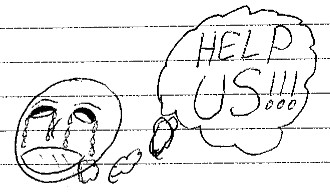Florida DOC Tablet Saga
When tablets came out in 2017 the very first tablets were sold to the
prisoners. I had a loved one to buy me one. Then the Florida Department
of Corrections (FDOC) decided to change the mail to digital mail, so
FDOC picked up all tablets that the prisoners paid for and came back
around and passed out free tablets for every one. Since then all tablets
have been updated no less than three times.
This comrade just got released from a Close Management Unit and was
transferred to Hamilton C.I. Since I got here I found out that for the
past year the Property Room Sergeant has been confiscating tablets, most
of the time giving prisoners a disciplinary report for tablet tampering
in which prisoners are found guilty 99% of the time and are suspended
indefinitely from having another tablet. On top of this, most now have a
loan on their inmate trust fund account of $130 restitution. FDOC gave a
little for a period of time, then turned around and took everything.
They gave the tablets, tablets belong to the state, and now they have an
excuse to take them.
The Prisoner Population
I’ve been in prison for 28 years and this whole thing changed. This
is not a prison anymore, this is a child care center for these fools to
hang out. Everybody wants to belong to a gang but let me remind you that
before you take that oath, you need to find out why that nation, group,
or gang was born. It was born by the oppressed to fight in unity as a
group against oppression. Who is the oppressor? Pigs that work here, the
administration, the system, the state, the government. I know my
history, do you know yours?
FDOC have a total of no more than 30 officers per shift (with 1/4 of
them pushing overtime) and that is counting the front controls
operators. It is embarrassing how that small group of pigs can control,
oppress, and abuse no less than 1250 to 1500 prisoners, thugs,
gangsters, criminals, and gang members. FDOC prisoners have no unity and
no self-respect. I said self-respect because I might have a debt of a 78
cent soup and you ready to kill me, but the pigs call you and the whole
dorm a “bunch of bitches” and you put your head down.
FDOC prisoners, mostly gang members, would rather have the pigs as a
friend than anybody else with the same uniform color. They respect the
pigs more than their fellow prisoners. Ali-al
haf from Georgia, I read your article in the ULK Winter 2025 issue –
you are not alone! I think it is a virus that is spreading. Now
prisoners do the pigs’ jobs. They check and make sure that your cell
door is secure, they pass mail, they make sure you don’t eat twice in
the chow-hall, they even stand next to some of the pigs like bodyguards.
All this ass kissing and at the end of the night your ass is just like
mine: locked down behind a door. It doesn’t matter how down you might
think the pigs will be, at the end of the day they will not put their
paychecks on the line because of you. Coño Preso – look at the fucking
color of your uniform. Ain’t you noticed that it has a different
color!
Learn the difference between a right and a privilege. Use the
grievance process, you must leave a written historical track in case
issues need to be handled at another level. Written proof is all there
is that shows a peaceful avenue was tried before going all the way out.
All those comrades that in the past sacrificed their prison sentences,
release dates, family, and some of them even their lives for this new
generation to throw their hands up and surrender. Really? That is how
we’re doing time in 2025?? Where are your cojones??
Let’s get together in the same line of thought. Before you complain
about not having a tablet or not being able to watch the game on TV, we
need to think about how high canteen prices are, receive more gain time,
bring parole to lifers like me, get better food. Sorry, but prison is
not a place that you come to to hang out with your homies and have a
good time. This is the cemetery of the walking living dead, where your
whole future could change in 15 seconds. Don’t forget where you are,
your culture, where you came from. Do not submit to do the pigs’ work. I
won’t be surprised if in a few more years visitation is done solely via
video and they stop all contact visits. If we don’t get together and
stand up and work as a group, as a family, we are going to keep losing.
Remember that before you became a gang member you were a man, a human
being – not a beast. And I refuse to be trapped like one. No quiero
abrazos con la vida hasta que mi pueblo sea libre.
A Georgia prisoner echoes Ali-al haf’s report: Here at
Baldwin State Prison in Hardwick, Georgia, some things are the same as
Valdosta, GA. Gang members having a room all to themselves and picking
on the weak, taking all their property.
In one building the unity manager has her boys, [gang members] to
beat some prisoners up (mostly whites). It is told that the female
officer unit manager is a [gang] member. She is always talking down to
the whites.
The drugs are plenty here and the drug called strips is where most go
to.
The mail system is really screwed up. Mail is passed out maybe two
times a week. The mailroom officer puts mail out daily for night shift
to pass out.
Stabbings happen daily. Some cut themselves to be placed in the hole
to get away from the gang members. Some gang members force some, mostly
whites, to put money on their books or send them cash and make them go
to the store for the full amount only to take it from them and officers
let it happen.
Baldwin State has nicknames such as “Bloody Baldwin”, “Body Bag”, and
“Cut Throat”. The names fit well.
$prayer responds from Pennsylvania: Our comrades here
in the PADOC would rather be focused on going at each other and being on
the C.O.’s side and doing a bunch of nonsense, it’s sad. Our comrades
aren’t even focused on their own lives like they should be instead of
worrying what others are doing. They oppress their other comrades like
they’re the oppressor, like they’re not oppressed by the oppressors too.
The oppressing comrades do what the oppressors want them to do so they
take the heat off of their own backs and put it on their own comrades’
backs. Like I really can’t believe all of the OPPRESSION between
comrades, it’s really sad. Like the oppressing comrades call us (who
stand against the criminals of permission “cops”) rats, but look at what
they’re doing, they’re doing the oppressors’ bidding. So who’s the real
rat? They are, aren’t they, since they’re doing the oppressors’ bidding
right? They really need to ask themselves who’s the rat. We’re supposed
to stand up to our oppressors, not stand with them against our own
comrades. Am I right or am I wrong?
MIM(Prisons) adds: We also published a report in
February from a Tennessee
prisoner being extorted by a drug gang that was protected by staff.
Ali-al haf’s article really struck a cord with our readers, indicating
the state of affairs across the prison systems on occupied Turtle
Island. This relates to our campaign: Stop Snitching, Stop
Collaborating, where comrades have repeatedly pointed out that you can’t
snitch on pigs. These prisoners described above are collaborating with
the enemy.
But lumpen orgs working with the imperialists is not a forgone
conclusion. We know this because there are plenty examples in history of
lumpen orgs working on the side of anti-imperialism, especially in the
internal colonies of the United $tates. We also know this because, as
Trauma points out, there is a common material interest in the lumpen
coming together for conditions and for respect. And as $prayer says,
most prisoners should be comrades on the same side. We can make that
happen through education and organization. We must build institutions
that serve the interests of the lumpen better than the state does, to
win over the masses.







 Alabama
Alabama
 Alaska
Alaska
 Arizona
Arizona
 Arkansas
Arkansas
 Army Post
Army Post
 California
California
 Colorado
Colorado
 Connecticut
Connecticut
 Delaware
Delaware
 District of Columbia
District of Columbia
 Federal
Federal
 Florida
Florida
 Georgia
Georgia
 Guam
Guam
 Hawaii
Hawaii
 Idaho
Idaho
 Illinois
Illinois
 Indiana
Indiana
 Iowa
Iowa
 Kansas
Kansas
 Kentucky
Kentucky
 Louisiana
Louisiana
 Maine
Maine
 Maryland
Maryland
 Massachusetts
Massachusetts
 Michigan
Michigan
 Minnesota
Minnesota
 Mississippi
Mississippi
 Missouri
Missouri
 Montana
Montana
 Nebraska
Nebraska
 Nevada
Nevada
 New Hampshire
New Hampshire
 New Jersey
New Jersey
 New Mexico
New Mexico
 New York
New York
 North Carolina
North Carolina
 North Dakota
North Dakota
 Ohio
Ohio
 Oklahoma
Oklahoma
 Oregon
Oregon
 Pennsylvania
Pennsylvania
 Puerto Rico
Puerto Rico
 Rhode Island
Rhode Island
 South Carolina
South Carolina
 South Dakota
South Dakota
 Tennessee
Tennessee
 Texas
Texas
 Utah
Utah
 Vermont
Vermont
 Virginia
Virginia
 Washington
Washington
 West Virginia
West Virginia
 Wisconsin
Wisconsin
 Wyoming
Wyoming

